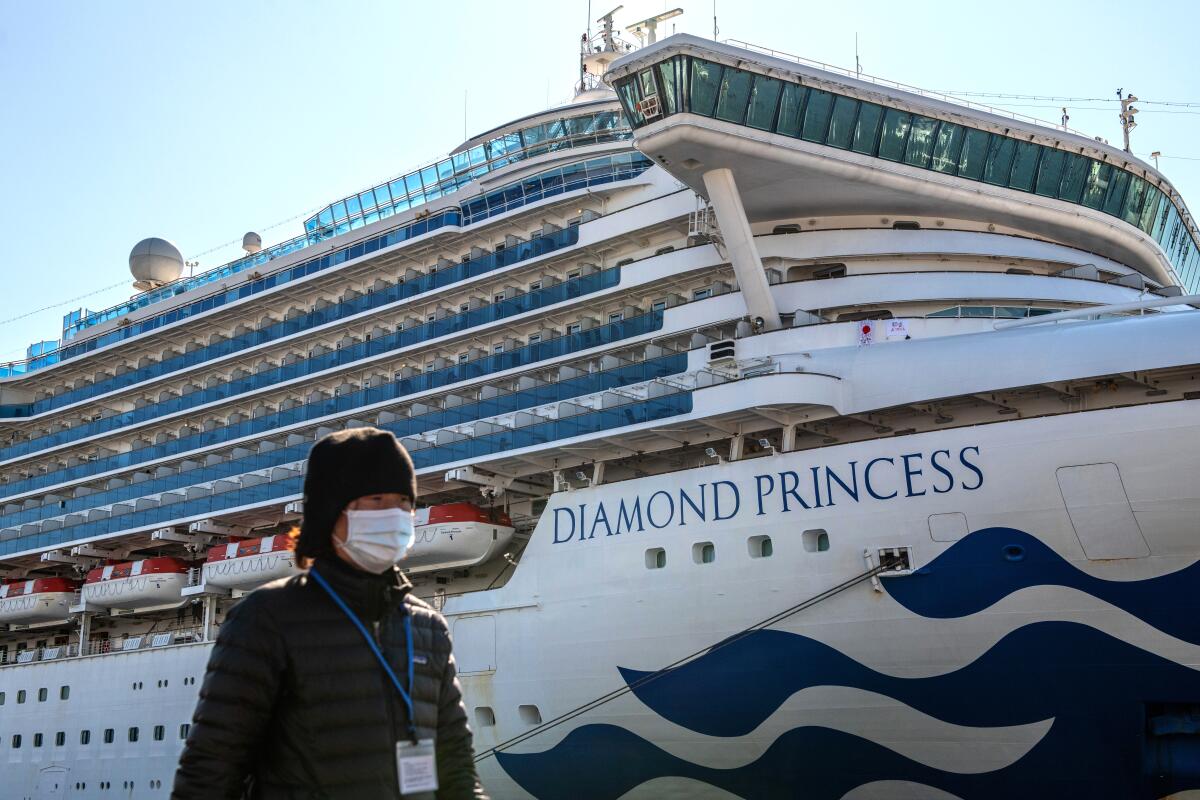Hotels and cruise ships offer to serve as hospitals. Is it a good idea?

- Share via
At the Sheraton Fairplex Hotel in Pomona, the gym and the pool are closed, the breakfast buffet has been shut down and the 244-room facility is no longer accepting reservations.
Instead, the hotel on the grounds of the Fairplex is playing a role in the fight against the coronavirus outbreak by housing more than 30 medical professionals and first responders who have been exposed to the virus or have tested positive and have nowhere else to self-quarantine.
“So far, it’s worked well,” said Miguel Santana, chief executive of the Fairplex, the 487-acre facility that includes the hotel and annually hosts the Los Angeles County Fair and other events.
Since the pandemic all but shut down the nation’s travel and tourism industries, some hotels and cruise lines have offered their empty rooms to take pressure away from hospitals that have been inundated with people suffering from COVID-19.
Several government agencies in the U.S. and abroad have turned to hotels to house the sick and front-line warriors in the crisis. As for cruise ships — not so much.
Healthcare experts and engineers say they aren’t surprised that government agencies are reluctant to transform cruise ships into floating hospitals.
The latest updates from our reporters in California and around the world
Andrea Hricko, professor emerita at USC’s Keck School of Medicine, said the close quarters and the history of outbreaks on cruise ships makes medical use “a terrible idea.”
“It would add to our public health crisis to operate cruise ships as hospitals,” she said.
Neither hotels nor cruise ships would be ideal to treat critically ill COVID-`19 patients, but hotels could house “low acuity care” patients because conference centers and other facilities can hold necessary medical equipment, Summer Johnson McGee, dean of the School of Health Sciences at the University of New Haven, said in an email.
“A cruise ship is no place for a critically ill person, and a hotel cannot be an ICU,” she said.
Another problem is that hotels and cruise ships usually have a common ventilation systems that would make it difficult to keep the virus from spreading from coronavirus patients to people who don’t have the virus.
“If the hotels and cruise ships are used only for non-coronavirus patients or only for coronavirus patients, they should be OK,” Qingyan “Yan” Chen, a professor of mechanical engineering and expert on ventilation systems at Purdue University, said in an email. “But, one should never mix the two groups of patients together. By mixing them, it is likely to cause cross-contamination and those non-coronavirus patients would be in great risk.”
Carnival Corp., the world’s largest cruise company with 105 cruise ships under its nine brands, made the offer March 19 to convert ships for use as temporary hospitals. The company said the ships, with a total of 254,000 beds, could treat non-COVID-19 patients, freeing up land-based hospitals to focus on victims of the virus.
“As part of the offer, interested parties will be asked to cover only the essential costs of the ship’s operations while in port,” Carnival said in a statement.
The offer came a few days after Carnival announced that “in an abundance of caution” it would temporarily halt operations of its North American brands, including Carnival Cruises and Princess Cruises.
The U.S. State Department issued a warning March 8, urging U.S. citizens to stop traveling on cruise ships, saying passengers on the vessels are more likely to contract the coronavirus infection and could be subject to quarantines and other international travel restrictions.
Carnival has had conversations with U.S. and foreign governments about using empty cruise ships, but no final agreement has been reached, Carnival spokesman Roger Frizzell said Tuesday.
Two other giant global cruise lines, Royal Caribbean and Norwegian Cruise Line, couldn’t be reached for comment.
Frizzell dismissed contentions that people are more likely to contract a disease, such as a norovirus, on a Carnival cruise ships than anywhere else.
“This is a myth,” he said in an email. “Across the world, there are norovirus outbreaks on land that occur in roughly 13% of the population each year, yet norovirus only occurs on cruise ships at a rate of .007%.”
Cruise ships are cleaned regularly and inspected by the Centers for Disease Control and Prevention, Frizzell said.
But Hricko, the retired professor of preventive medicine, pointed to CDC data showing that norovirus outbreaks have been reported on cruise ships between nine and 12 times a year over the last five years.
McGee, the University of New Haven dean, worries that cruise ship cabins are too small for a bed, healthcare equipment and medical crews to care for an ill patient.
“While ships are generally handicap accessible, they were not designed to allow hospital beds, gurneys and other large equipment to be available to patients and staff,” she said.
Frizzell said all cruise ship rooms comply with the Americans With Disabilities Act.
The hotel industry has been hard hit by the pandemic, with occupancy rates across the U.S. dropping from about 80% a month ago to an average of about 20% at the end of March, according to STR, a hotel data firm.
The American Hotel and Lodging Assn., a trade group for the nation’s hotels, asked last month for $150 billion in aid from the Trump administration to survive the crisis.
More than 15,000 hotels have offered to provide temporary housing for emergency workers and healthcare staff, the trade group said. The association said some hotels have also volunteered to be used as temporary hospital facilities, but a spokesman for the group said he didn’t know how many have been converted for hospital use.
In a Pentagon briefing, Lt. Gen. Todd Semonite, commanding general of the U.S. Army Corps of Engineers, said last month that the U.S. Army and the Army Corps of Engineers have created a blueprint for converting hotels, college dormitories and convention centers into hospital rooms.
The blueprint would require removing carpeting, adding nurses stations, emergency backup power, electrical outlets, mobile workstations, linen hampers and bed tables, among other changes.
To ensure the virus doesn’t escape through the ventilation system, Semonite said, hotel and dormitory rooms must be converted into “negative pressure” rooms by adjusting the ventilation system to pump more air in than out and sealing the front door with plastic sheeting and a zipper opening.
“It’s a relatively simple process,” he said.
Most of the rooms offered by the hotel industry are being used to house first responders and COVID-19 patients who have mild symptoms and don’t need advanced medical treatment.
Last month, New York began housing healthcare workers who have coronavirus symptoms in hotels, after the same strategy was deployed in Spain and China.
San Francisco also announced last month that it was identifying at least 3,500 hotel rooms to house people who tested positive for the virus but don’t need a hospital room.
Aimbridge Hospitality — the largest operator of Marriott, Hilton and Hyatt hotels — announced a deal in late March with Trestle Health & Housing to make more than 700 hotels with 103,000 rooms across the U.S. available to help in the fight against the pandemic, according to Trestle.
In Los Angeles County, the Sheraton Fairplex Hotel is one of four hotels and an RV park being used to house more than 60 medical professionals, first responders and those who have been exposed to the virus but don’t need acute medical treatment yet.
“It’s not a hospital like what you would see at Pomona Valley Medical Center, with respirators and other equipment,” Santana said. “The rooms are as they were before.”
More to Read
Inside the business of entertainment
The Wide Shot brings you news, analysis and insights on everything from streaming wars to production — and what it all means for the future.
You may occasionally receive promotional content from the Los Angeles Times.











